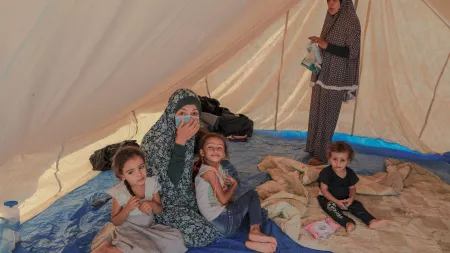7 December 2023 – Displacement, hunger, lack of medical care and clean water, and the onset of winter are stretching the coping abilities of women and children to the absolute limit, CARE warns on the occasion of the two-month mark of the armed conflict in Gaza. Although all 2.3 million Palestinians in Gaza are in urgent need of humanitarian assistance, the war is disproportionally affecting women and children.
One month ago, I thought the suffering could not get any deeper, but the downward spiral keeps worsening,said Hiba Tibi, CARE Acting Deputy Regional Director for the Middle East and North Africa.
“We are seeing women and children across the Gaza Strip under immense stress, confronted with unthinkable horrors. Child mortality, hunger, and psychological trauma are all reaching unprecedented highs. The current situation is bringing them to breaking point, making anything beyond focusing on survival impossible,” added Tibi.
Over 1,200 people have been killed in Israel, while families of Israeli and foreign hostages are still desperately waiting for their release.
In Gaza, at least 16,248 people have reportedly been killed in just two months, including an average of 115 children per day, making this the deadliest conflict for children in current times. Almost 70% of those killed in Gaza since October 7th are women and children.
In Gaza, women are the last to eat and children are the first to die,said Aaron Brent, CARE West Bank and Gaza Acting Country Director.
“The tragic reality for children is that they are hiding to survive the bombing, mourning dead parents and siblings, fleeing with their families, or collecting firewood to keep warm instead of playing or going to school. Education is a forgotten dream for children terrified this day might be their last,” concluded Brent.
Risk of famine and deadly diseases
According to the World Food Programme, there is a high risk of famine and cases of dehydration and malnutrition are increasing rapidly. “Mothers eat once per day in favour of their children’s health. Lack of medical care, hygiene, and high levels of malnutrition while living in overcrowded shelters are a poisonous mix, and we fear the numbers of women and children dying of otherwise preventable and treatable diseases will rise,” said Hiba Tibi.
1.9 million people, almost 85% of the population, have been displaced in the past two months, often multiple times and into increasingly compressed spaces, unsure if they can ever go back to their homes as over 60% of all houses in Gaza have been severely damaged or destroyed. Almost 1.2 million Palestinians live in 156 UNRWA shelters, another 191,000 stay in schools or community centers, while others have found refuge with family, often sharing small rooms with 30 or more people. Overcrowded shelters lack privacy or means to retain dignity and increase the risk of gender-based violence and sexual exploitation and abuse against women and girls.
“Mothers are telling us their children have stopped speaking or eating because of what they have seen and lived through. Others are crying and screaming with every loud sound they hear,” said Hiba Tibi.
Two months of war have traumatized an entire generation of children,concluded Tibi.
Critical infrastructure such as water networks, sanitation facilities, and grain mills have been razed to the ground. Only 40% of the hospitals and medical facilities are partly operational, leaving many of the more than 43,600 wounded people and 180 mothers giving birth every day without safe medical or delivery assistance. “Our team has spoken to doctors who must perform C-sections without anesthesia and see mothers who lose their babies right after giving birth because there is no power to run incubators that could keep them alive,” added Hiba Tibi.
An urgent plea to protect lives
CARE continues to call for all parties to uphold their obligations under international humanitarian law, which start with the protection of civilian lives. Hostages illegally taken following the abhorrent attacks in Israel two months ago must be immediately released unharmed. All allegations of rape and gender-based violence must be promptly and thoroughly investigated. Humanitarian aid must flow, not trickle, through all border crossings in Gaza, starting with the largest one, Kerem Shalom. Finally, only a lasting ceasefire can start addressing the immense suffering of the Palestinian population of Gaza and avert a complete humanitarian disaster. Two months later, people in Gaza don’t have time for long deliberations. They need a ceasefire NOW.
CARE'S work in Gaza
CARE International has been operating in Gaza and the West Bank since 1948. Prior to 7th October, we were supporting about 200,000 Palestinians in Gaza and we continue to support about 300,000 in the West Bank to meet basic food needs, improve farming and agriculture, empower women to earn an income, support women’s leadership, and improve health programs focused on gender-based violence, sexual and reproductive health, and children’s mental health.
Since the escalation of the conflict, the CARE team in Gaza was able to distribute 6,500 hygiene kits, shelter items such as blankets and mattresses for 3,000 people, and 154,000 litres of water to vulnerable displaced people. Each kit covers the hygiene needs of a family of five for one month. CARE also supplied two mobile clinics with medicine, serving around 4,000 patients for one month.
For media inquiries, please contact Iolanda Jaquemet, Senior Humanitarian Communications Coordinator, CARE International via: [email protected].
